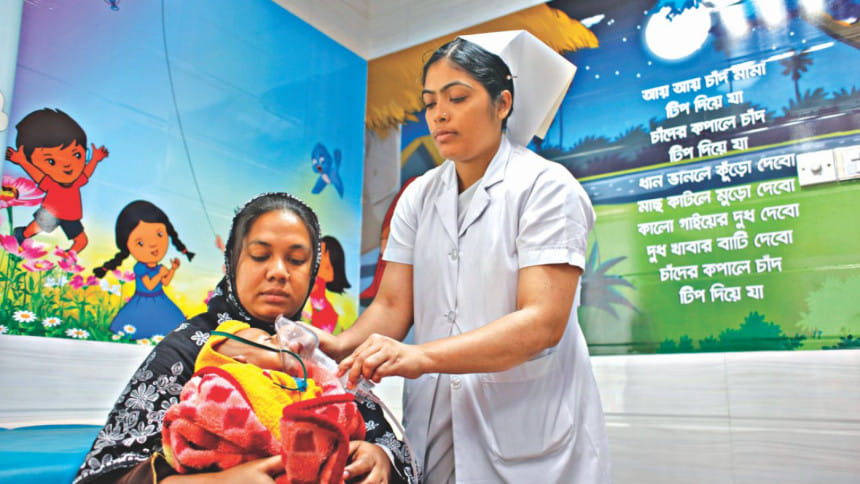Helping little ones breathe

Zarif holds the mask and sits patiently for around ten minutes for the liquid asthma medicine to convert into a breathable mist.
This is the third time he has had to use the nebuliser in a day.
The seven-year-old, a second grader, has been suffering from asthma attacks for the last six months.
“Whenever Zarif finds it difficult to breathe, he takes a puff of his inhaler. He does this even in the middle of the night; he knows he needs to do so to survive,” says Zarif's mother, Shahana.
Zarif was seeking treatment at Child Asthma Centre in Dhaka Shishu Hospital (DSH) located in the capital's Sher-e-Bangla Nagar.
“The funny thing is,” Shahana says, “when we visit our hometown in Barishal, Zarif's asthma seems to disappear. Dhaka seems to make his ailment worse.”
According to Prof Dr Bashir Ahmed of National Institute of Diseases of the Chest and Hospital (NIDCH), asthma is increasing among adults as well as children. He said pollution, urbanisation and toxic gas emission from vehicles are the causes of asthma flare-ups.
Like Zarif, several other children sit patiently in the waiting room of the asthma centre. Bright and colourful images adorn the walls to make them feel comfortable.
The asthma centre in DSH was established on May 2, 2017 to mark World Asthma Day. A total of 12 staff members, including professors, assistant professors and two nurses, are appointed at the centre. Nurses trained in asthma care demonstrate to children how they should use an inhaler.
Before its launch, children with asthma would have to visit NIDCH. This asthma centre is the first of its kind especially designed for children, said Assistant Professor Dr Kamruzzaman of respiratory medicine department. A total of 5,044 children with asthma have received treatment from the centre till date, he added.
Young patients from different parts of the country suffering from various respiratory problems seek treatment from the centre. Every day around 52 patients visit the centre seeking treatment. The centre is equipped with the latest technology, including spirometry and nebuliser machines.
When asked about the specifics of asthma, Dr Kamruzzaman said, “Asthma is often genetic, although not everyone in the family may have it. It is a controllable, but not curable, condition. So we provide counselling to children as well as parents.”
The centre delivers all kinds of treatment for asthma under one roof. Most patients are children aged three to five. New patients can seek treatment for Tk 200 while those who have already visited before need to pay Tk 100. Nebuliser treatment costs Tk 200. Tests to diagnose asthma in a child costs Tk 1,000.
Dr Kamruzzaman added that patients who cannot afford the medical tests can seek financial assistance from the Ministry of Social Welfare.
The centre is open on weekdays from 8:30am to 2:30pm.
“Many parents believe that using an inhaler counts as the last stage of asthma treatment. But we inform them that it is a controllable disease and using an inhaler is only the primary stage,” Dr Kamruzzaman said.
Through education and appropriate treatment, children with asthma can enjoy a completely normal childhood, he concluded.

 For all latest news, follow The Daily Star's Google News channel.
For all latest news, follow The Daily Star's Google News channel. 



Comments